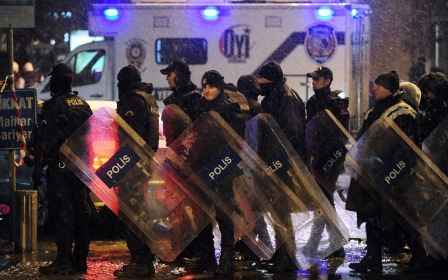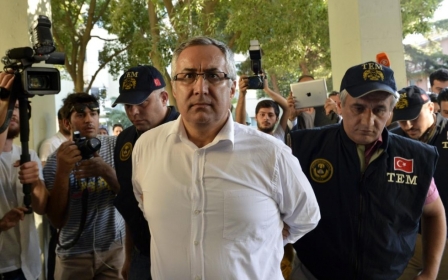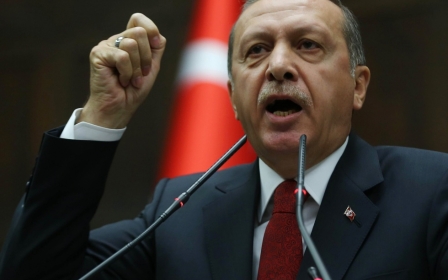AKP, Gulen battle takes another turn in Turkey

Twenty-two police officers were taken into custody in Turkey earlier this month in the latest round in the purported battle between the Turkish government and the Gülen movement. Charged with “illegally wiretapping” politicians, business people and bureaucrats, 18 of the 22 suspects were released on 7 January after the prosecutor obtained their testimonies.
This is just the latest wave of a number of similar operations that have targeted police officers in Turkey – a total of 39 people remain in custody. A number of high-ranking officials, including the former chief of Istanbul police Ali Fuat Yilmazer and former Istanbul counterterrorism unit chief Yurt Atayun, are charged with “espionage” and “coup attempt”.
While Yilmazer was one of the main intelligence providers to the judicial investigation during the notorious Ergenekon and Sledgehammer cases, Atayun was one of the officials in the team who requested summoning Hakan Fidan, the undersecretary of the National Intelligence Organisation (MIT), during the Kurdish Communities Union (KCK) investigations in 2012.
All three cases targeted military personnel, academics, journalists and NGO representatives as well as Kurdish intellectuals since 2008.
Additional charges like “violation of confidential communications”; “profiling personal information” and “forming organisations with the aim of committing crime” were directed against the arrested policemen.
Parallel State
The latest arrests follow another round of detainments on 14 December 2014. The similarity between the two appears to be linked to a notorious corruption investigation in 2013. Since the 17-25 December 2013 corruption and bribery probe, which targeted the sons of government ministers, high-level bureaucrats and prominent business people, the Turkish government waged a full-fledged war against the “state-like formations” within the state bureaucracy.
President Recep Tayyip Erdogan describes the raids as part of a crackdown on the “parallel state” seeking to topple his government; he believes the Gülen movement, led by his former ally Turkish-Muslim cleric Fethullah Gülen, is orchestrating dissent. The cleric has been based in the US since 1999, but his teachings are presented in schools and study centres in more than 160 countries around the world.
It is estimated that members of the Gülen movement have a strong presence in the judicial and security circles in Turkey, as well as in bureaucratic structures.
It is alleged that those who were arrested on 14 December 2014 and the recently detained police officers have close connections with the Gülen movement. While security and judicial spheres are believed to initiate what the government calls the “17-25 December plot” with the aim of toppling the government, the Zaman and Samanyolu TV journalists who were arrested on 14 December are seen as the media mouthpiece of the Gülen movement.
Following a comprehensive investigation and counter operation against the Gülenists, the government has been hunting every individual with a potential connection to the widespread “plot”.
The police officers are believed to be the ones who leaked illegally acquired voice recordings – allegedly of Erdogan and his inner circle – and Zaman journalists were purportedly the proprietors of inciting chaos.
“This [the corruption probe] was never about finding the concrete reasons of the corruption,” recently wrote Markar Esanyan, a columnist at pro-government daily Yeni Safak. “The so-called evidence for corruption was gathered through illegal methods, which eventually resulted in the dismissal of charges,” he added.
Contents of voice recordings
In the last days of 2013 and in the first months of 2014, the Turkish government executed a comprehensive plan to hinder the 17-25 December corruption investigation by removing prosecutors from their posts and reshuffling police officers.
On the eve of the local elections of 30 March, dozens of voice recordings were leaked, allegedly revealing the “dirty dealings” of government officials behind closed doors, including Erdogan himself. Mysterious Twitter and YouTube
Phone conversations between the ministers and their sons were also among the leaked “tapes”.
It is still unknown whether the voice recordings exposed genuine high-level corruption, or whether they were fabricated and leaked by Gülenist circles. However, as the government was quick to link the “Gülenist plot” to the corruption probe, a healthy investigation to find out the reality behind the phone leaks never took place.
In the meantime, Erdogan’s call to chase after the elements of the “parallel structure” was the mantra of the post-local election period, in which the Justice and Development Party (AKP/AK Party) once again managed to secure more than 44 percent of the nationwide votes, acquiring the necessary public approval to fight against the Gülenists.
“We will get in their cave to catch them,” said Erdogan on multiple occasions. Since then the illegal wiretappings could never make it to a court as evidence, and the Gülenist witch-hunt has not died down.
Legality of the situation
All the suspects of the corruption probe were later released and the only action that was taken in relation to the 17-25 December process was the resignation of four former government ministers.
According to Faruk Mercan, a former Zaman newspaper journalist who wrote a biography on Fethullah Gülen, the 17-25 December probe should not be considered a coup attempt, as four former ministers have been investigated on corruption charges by a parliamentary committee. “This means that there was ongoing corruption,” he told Middle East Eye.
However, during the last convention of the committee on 5 January, the request for to send the former ministers to the Supreme Council was denied with the overwhelming majority of AKP parliamentarians.
The council is responsible for trying members of the parliament who normally possess parliamentary immunity that prevents the judicial forces from prosecuting them during their term. Only the General Assembly has the authority to cancel their immunity, and thus pave the way for trial.
With this decision, the corruption investigation seems to be history and the leaked voice recordings are to be destroyed. On a move to protest the commission’s decision, the main opposition Republican People’s Party (CHP) published the copies of the “tapes” on its Facebook page.
According to information technologies lawyer Gokhan Ahi, wiretapping could only be conducted with a designated court order. Without a court order, they are neither valid as evidence, nor legal in nature.
“There are two types of legal wiretapping in Turkey: intelligence and judicial,” Ahi told MEE. “In any case, if no criminal activity was discovered through wiretapping, the records should be deleted and the individuals concerned should be informed.”
The problem, Ahi stressed, is that prosecutors do not inform individuals whose phone calls were taped, nor are recordings being destroyed once an investigation is finished.
“Unless data is destroyed and we are sure that it was done properly, we can clearly say that no one is safe in Turkey," he said.
The battle between the government and the Gülen movement will be on the political agenda in the upcoming months, especially as the general election approaches this summer. The extent to which legal practices will be used for more political gain remains to be seen.
Stay informed with MEE's newsletters
Sign up to get the latest alerts, insights and analysis, starting with Turkey Unpacked
Middle East Eye delivers independent and unrivalled coverage and analysis of the Middle East, North Africa and beyond. To learn more about republishing this content and the associated fees, please fill out this form. More about MEE can be found here.




